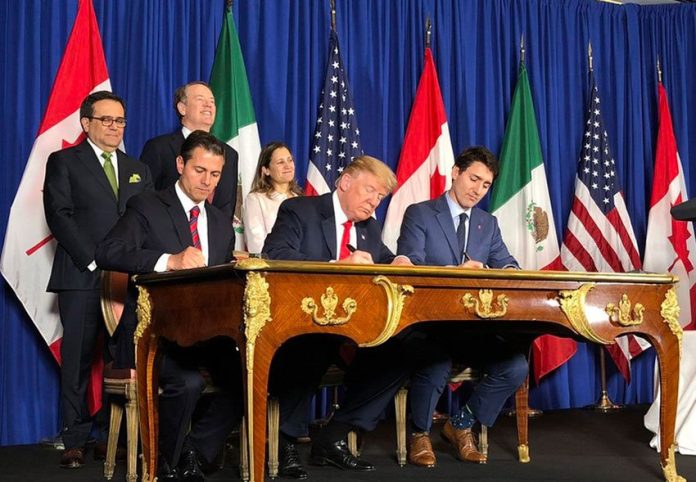Mexico, the United States and Canada signed a new trade deal today, officially ending a drawn-out negotiation that lasted more than a year and was characterized by hardline demands by the U.S. and repeated threats by President Donald Trump to pull out of a three-way accord.
On his last day in office, President Peña Nieto joined Trump and Canadian Prime Minister Justin Trudeau at the G20 meeting in Buenos Aires this morning to sign the new North American trade agreement, now known as the United States-Mexico-Canada Agreement (USMCA).
The signing took place despite strong demands by Mexican business leaders last month that the U.S. withdraw its steel and aluminum tariffs first. The tariffs remain in place.
The agreement will now be sent to the respective legislatures of the three countries for ratification, with expectations that it will take effect at the start of 2020.
Trade rules established by the nearly quarter-century-old North American Free Trade Agreement (NAFTA) will remain in force while the ratification process takes place.
The chief negotiators of the three countries, Economy Secretary Ildefonso Guajardo, U.S. Trade Representative Robert Lighthizer and Canadian Foreign Affairs Minister Chrystia Freeland, were on hand at the signing ceremony, which took place at a hotel in the Argentine capital.
Flanked by Peña Nieto and Trudeau, Trump acknowledged that the process to reach the agreement had, at times, been difficult but praised the result.
“It’s been long and hard. We’ve taken a lot of barbs and a little abuse, but we got there,” he said.
“This has been a battle and battles sometimes make great friendships. This is a model agreement that changes the trade landscape forever.”
Trudeau also praised the new agreement but reminded Trump that tariffs on Canadian steel and aluminum exports to the United States still apply and called for their removal.
“The new agreement lifts the risk of serious economic uncertainty that lingered throughout the trade renegotiation process – uncertainty that would have only gotten worse and more damaging had we not reached a new NAFTA,” Trudeau said.
“There is much more work to do in lowering trade barriers and in fostering growth that benefits everyone, but reaching a new free trade agreement with the United States and Mexico is a major step for our economy.”
Both Trump and Trudeau congratulated Peña Nieto for his role in reaching the new agreement, which in Mexico is known as T-MEC.
The outgoing president said that the new “treaty is an expression of the will shared by our three nations to work for well-being and prosperity.”
Peña Nieto added: “The act that we formalize today is proof that Mexico, the United States and Canada are close not just because of geography but because of the values and ambitions they share. They are ready to start a new stage of shared history.”
On Twitter, he wrote that the USMCA “is the first trade agreement with elements to respond to the social impact of international trade: it facilitates the participation of more sectors of the economy, increases the protection of workers’ rights and strengthens the care of the environment.”
Moises Kalach, a businessman and international trade official for the Business Coordinating Council (CCE), told the newspaper El Financiero that the new agreement would provide “clear rules for 75% or a little more” of Mexico’s exports.
He said that the signing of the agreement was cause for celebration.
“It’s a great message to send to markets, it’s a great message of optimism for our country. We can say ‘here there are things that are working,’ this [agreement] is something that is solid, valid . . . it’s a bet for the future that goes beyond a six-year presidential term . . . it’s an instrument that will last going forward,” Kalach said.
Kenneth Smith, the head of Mexico’s technical negotiating team, said that Mexico’s automotive, aerospace, pharmaceutical and agri-food sectors were among those that stood to benefit most from the new agreement.
For Peña Nieto, who tomorrow will hand the presidential sash on to Andrés Manuel López Obrador, the signing of the agreement allowed him to finish his six-year term, which has been tarnished by corruption and violence, on a positive note.
“On my last day as president, I feel very honored to have participated in the signing of the new trade agreement between Mexico, the United States and Canada . . .” he said.
Source: El Financiero (sp)
